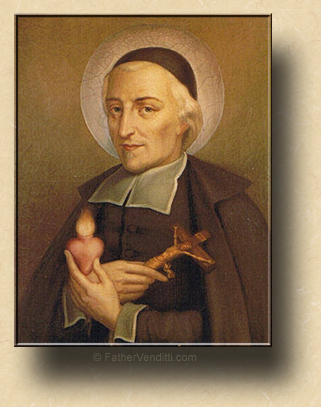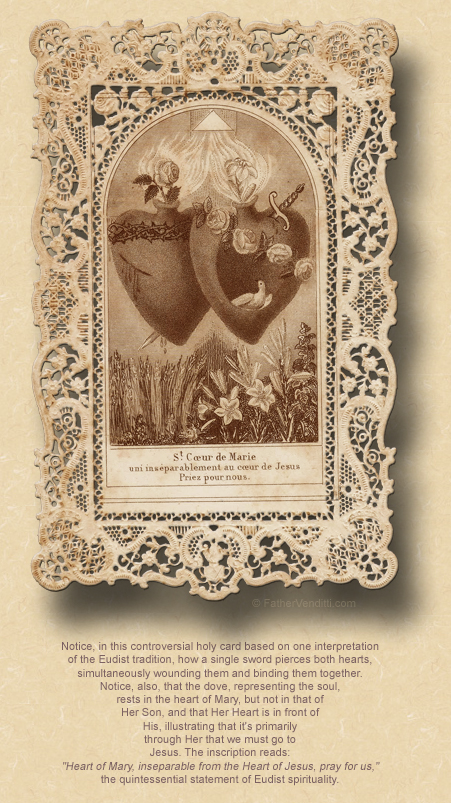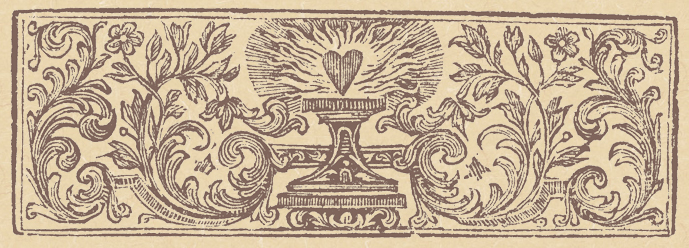The Inseparable Link between Life and Love.
The Nineteenth Saturday of Ordinary Time; or, the Memorial of Saint John Eudes, Priest.
Lessons from the primary feria, according to the ordinary form of the Roman Rite:
• Joshua 24: 14-29.
• Psalm 16: 1-2, 5, 7-8, 11.
• Matthew 19: 13-15.
|
When a Mass for the memorial is taken, lessons from the feria as above, or from the proper:
• Ephesians 3: 14-19.
• Psalm 131: 1-3.
• Matthew 11: 25-30.
…or, any lessons from the common of Pastors for One Pastor, or the common of Holy Men & Women for Religious.
|
The Third Class Feast of Saint John Eudes, Confessor.
Lessons from the common "Os justi…" of a Confessor not a Bishop, according to the extraordinary form of the Roman Rite:
• Ecclesiasticus 31: 8-11.
• Psalm 91: 13-14, 3.
• Luke 12: 35-40.
The Tenth Saturday after Pentecost; a Postfestive Day of the Dormition; and, the Feast of the Holy Martyr Andrew the Tribune and His Companions.*
Lessons from the pentecostarion, according to the Ruthenian recension of the Byzantine Rite:
• I Corinthians 1: 3-9.
• Matthew 19: 3-12.
FatherVenditti.com
|
8:57 AM 8/19/2017 — Before we reflect together on today’s Gospel lesson, a few words should be said about today’s saint. We've heard his name before in this chapel: we mentioned him in passing both on the Feast of the Sacred Heart of Jesus and on the Memorial of the Immaculate Heart of Mary. I've also mentioned to you, in in the context of talking to you about other saints, that the traditional Roman Breviary, which I use for my daily celebration of the Divine Office, often commemorates the saints by making the third lesson for Matins a very interesting and detailed biography of the saint;  so, I would like to share with you that lesson for the feast of Saint John Eudes, in what I hope is an understandable translation: so, I would like to share with you that lesson for the feast of Saint John Eudes, in what I hope is an understandable translation:
John was born in 1601 of good, devout parents at the village of Ri in the diocese of Seez. While yet a boy, when he was refreshed with the Bread of Angels, [that is, when he received his First Holy Communion] he vowed perpetual virginity. In school, where he pursued his studies in a praiseworthy way, he shone for his wonderful piety. He loved the Blessed Virgin above all, and burned with great charity for his neighbor. Having joined the Berullian Congregation of the Oratory, he was ordained priest at Paris. He was made rector of the house of the Oratory at Caen, but left it, although sadly, to educate suitable young men for the ministry of the Church. To this end, with five companions, he founded the congregation of priests to which he gave the most holy Names of Jesus and Mary, and opened the first seminary at Caen, which was followed later by many others. In order to call sinful women back to a Christian life, he founded the Order of Our Lady of Charity. Of this noble tree, the Congregation of the Good Shepherd of Angers is a branch. [Angers is the name of a town.] He also founded the Society of the Admirable Heart of the Mother of God and other charitable institutions. Burning with a singular love for the most sacred Hearts of Jesus and Mary, he was the first to think—not without some inspiration from God—of offering them a liturgical cult. As an Apostolic Missionary, he preached the Gospel to many villages and towns. Worn out with his great labors, he died peacefully on the 19th of August, 1680. Famous for many miracles, he was numbered among the Blessed by Pope Pius X, and among the Saints by Pope Pius XI on the day of Pentecost in the holy year, and his Office and Mass were extended to the universal Church.
Now, here at the Shrine we're always praying for the triumph of Mary's Immaculate Heart, but we don't often ask for the intercession of Saint John Eudes in that quest. His Congregation of the Hearts of Jesus and Mary is present here in this country, but not as extensively as in his native France, where they are known simply as the Eudist Fathers. When I was two years ordained, I made a pilgrimage with four other priests to a variety of Holy places in France, and we had the privilege of staying in the Eudist Fathers' house of studies in Paris, which is where I became acquainted with this saint. So, as we continue to pray for the triumph of Mary's Immaculate Heart, I would like simply to recommend that we invoke often the intercession of this great saint.
 I would also like to suggest that his life, in which he moved from place to place, first in this group and then in that, is a testimony to what we've talked about many times here in this chapel about letting the Lord lead us where he wants us to go, even though it turns out not to be what we had in mind for ourselves. I would also like to suggest that his life, in which he moved from place to place, first in this group and then in that, is a testimony to what we've talked about many times here in this chapel about letting the Lord lead us where he wants us to go, even though it turns out not to be what we had in mind for ourselves.
Now, yesterday’s Gospel lesson was from the beginning of chapter nineteen of Matthew, in which our Lord is questioned by the Pharisees about marriage and divorce. That lessons ends with verse twelve, with today's very brief lesson beginning with the very next verse, verse thirteen. In contrast to rather long lesson, today's is only three verses: children are brought to Jesus, He lays his hands on them and blesses them, the disciples try to prevent it, and our Lord rebukes them. It's a very common image for Holy Cards: our Lord sitting on a rock or something, with little children crawling all over Him; kind of a cuteness overload.
But these Gospel lessons haven't been put together by the Church over the centuries for the purpose of giving us cute themes for Holy Cards. These three extraneous verses about our Lord blessing children may seem odd in the sense that, in every other instance, when our Lord lays His hands on someone and blesses him or her, it's because that person is sick or crippled and our Lord is effecting a cure. There's nothing here to indicate that these children are suffering from any kind of malady, which may be the reason that our Lord's disciples try to shoo them away. But I tend to think that the Evangelist included these three verses here because of the Gospel lesson that immediately precedes them, in which our Lord declares that marriage is forever: the first purpose of marriage is children; without them, the whole institution of marriage makes very little sense from the Christian perspective. Pope Saint John Paul II used to talk about this a lot, and often brought into the conversation the whole question of childless couples, saying that they participate in their own way in this creative end, either by helping other families with their children, adopting unwanted children to be their own, or dedicating themselves to the service of the Church.
Separate the act of procreation from the concept of marriage, and you reduce marriage to nothing more than a public expression of romantic love. But romantic love is just an emotion, and no emotion lasts very long. So, if marriage is just an expression of romantic love, then why presume that a marriage continues to exist after the emotions have died? Take the question a step further:  if marriage is just an expression of romantic love, then why restrict it to a man and a woman? Why not make it available to any two people who love each other? Why even restrict it to two people, for that matter? Why not three or four or five? if marriage is just an expression of romantic love, then why restrict it to a man and a woman? Why not make it available to any two people who love each other? Why even restrict it to two people, for that matter? Why not three or four or five?
Now, this is the National Blue Army Shrine of Our Lady of Fatima, so it's safe to assume that no one's just going to pop in here for Mass who isn't, in some degree, passionate about his or her Catholic Faith; so, I think it's safe to assume that we're all equally distressed—as well we should be—over the attacks on marriage that we've had to endure in recent years. What may escape our notice, however, is the fact that all this is the direct result of the divorce—no pun intended—of marriage from it's primary purpose, which is the propagation and raising of children. And if you will forgive me for doing what should probably never be done in a homily, I will give you a personal opinion: that the high rate of divorce, as well as the high level of acceptance of the notion of homosexual marriage, even among Catholics, is the direct result of the failure of the Church, through her priests, to teach clearly and consistently the mortal sin of contraception. In our marriage preparation instructions, often the subject is not even addressed; and, when it is, it is confused and watered-down with inaccurate platitudes about conscience. Indeed, how many people are there who have been told, both inside and outside the confessional, that if they only pray about the matter, and decide it's not a sin for them, then they can contracept all they want and still receive Holy Communion? That has never, ever been the teaching of the Catholic Church, in spite of the fact that priests have been telling people this for decades now.
But, this is a homily at Holy Mass and not a lecture about Catholic dogma. Let it be sufficient, then, to confine ourselves to the message of the Gospel lessons of yesterday and today, which must be linked to be understood: that there is an inexorable link between marriage and children, that one is defined by the other, that neither makes sense without the other, that separating one from the other is what has led to the countless perversions from which our society now suffers, and that none of these ills can be healed until the two are reunited in the hearts and minds of all who seek the graces of marriage or children.
That being said, the simple fact is that, through a monumental sin of omission on the part of the Church herself, whole generations of Catholics are ignorant of the truth about marriage and children. It's not their fault, so we must pray for them, as well as for ourselves, so that the words of the Holy Prophet Ezekiel, may take root in us:
Turn and be converted from all your crimes, that they may be no cause of guilt for you. Cast away from you all the crimes you have committed, and make for yourselves a new heart and a new spirit (Ez. 18: 30-31 RM3).

* The central figure of one of the largest mass conversions—and martyrdoms—in Christian history, the Centurion Andrew, prior to a battle with the Persians toward the end of the third century, converted all 2,593 men under his command, then went on to win a decisive victory for Rome; but, Emperor Maximian, fearing an entire army of Christians in his empire, ordered him put to death along with the entire Legion.
|

